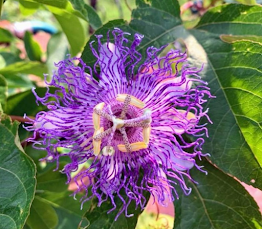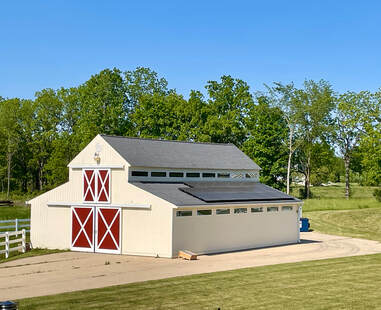"Live lightly upon the Earth"
|
In addition to being passionate about the farm itself, we also care deeply for the land and the native wildlife around us. We believe in working with and living alongside nature and do our best to lighten our impact as well as our carbon footprint. Here are a few of our current projects at Oak Forest that help us give back to the land we cherish:
|
Native Pollinators and Pollinator Habitat: We love our pollinators! And we're not just talking about our honeybees. We welcome all native pollinators and have worked hard to give them space were they can thrive. We have established and dedicated two acres of our property as native wildflower meadows. These areas were reclaimed from invasive plant species by hand then resown with over 20 native Michigan wildflower species. The meadows are left to nature save for a once yearly mowing, a required step to maintain an area as a meadow.
- In addition to our wildflower meadows, we also replaced a traditional garden area with a native pollinator garden. This type of garden area requires far less water and fertilizer than traditional gardens while helping to feed local bees, butterflies and hummingbirds. Our entire farm is herbicide and pesticide free.
- We happily provide nesting sites for native pollinators such as the mason bee house and leaf-cutter bee house seen below with a mason bee in action!
- One thing you're sure to see a lot of at Oak Forest in the spring is dandelions! As we say, "pardon the weeds, we're feeding the bees!" Dandelions (and clover) in lawn are an amazing food source for pollinators of all sorts, the more the merrier. We love our "lawn" for it's imperfect self. These little powerhouse flowers are welcome here!
- In addition to our wildflower meadows, we also replaced a traditional garden area with a native pollinator garden. This type of garden area requires far less water and fertilizer than traditional gardens while helping to feed local bees, butterflies and hummingbirds. Our entire farm is herbicide and pesticide free.
- We happily provide nesting sites for native pollinators such as the mason bee house and leaf-cutter bee house seen below with a mason bee in action!
- One thing you're sure to see a lot of at Oak Forest in the spring is dandelions! As we say, "pardon the weeds, we're feeding the bees!" Dandelions (and clover) in lawn are an amazing food source for pollinators of all sorts, the more the merrier. We love our "lawn" for it's imperfect self. These little powerhouse flowers are welcome here!
Wildlife: Half of our property has been left natural as a refuge for wildlife in the ever-expanding suburban sprawl. The ten natural acres include two acres of wildflower meadows as well as eight acres of native forest and scrub land. We manage these areas to help control and remove invasive plant species. We host a multitude of Michigan wildlife on our property, including deer, wild turkeys, Cooper's hawks, great horned owls and a pair of red-tailed hawks that nest successfully on our property each year.
- We also provide species appropriate nesting boxes/areas for Michigan natives such as eastern bluebirds, barn swallows, American robins, black-capped chickadees and tree swallows. Our bird houses are monitored via solar-powered nest cams to allow us to take part in the citizen science project, Nestwatch, and help provide real time data for our native bird species on our property. You can learn more about Nestwatch here.
- One of our recent projects was to construct a purple martin house in hopes of providing safe nesting habitat in the future for these amazing birds during their summer stays in Michigan. Learn more about purple martins and their conservation efforts here.
- We also provide species appropriate nesting boxes/areas for Michigan natives such as eastern bluebirds, barn swallows, American robins, black-capped chickadees and tree swallows. Our bird houses are monitored via solar-powered nest cams to allow us to take part in the citizen science project, Nestwatch, and help provide real time data for our native bird species on our property. You can learn more about Nestwatch here.
- One of our recent projects was to construct a purple martin house in hopes of providing safe nesting habitat in the future for these amazing birds during their summer stays in Michigan. Learn more about purple martins and their conservation efforts here.
Solar Power: As part of our goal to reduce our carbon footprint, we have a solar system that greatly helps to power our house and farm. Our solar project was completed in 2019 and as of 2023 has saved over 30,000lb of carbon dioxide emissions.
Gardening: We have a robust fruit and vegetable garden at Oak Forest which helps provide not only ourselves but friends, family and members of the community with locally grown produce. We enjoy growing common garden staples such as tomatoes, hot peppers, herbs and lettuce but our garden is also home to less common finds such as hardy kiwi, cucamelons and even saffron! Oak Forest Farms is entirely herbicide and pesticide free.
- Pest management in our garden is maintained by using beneficial nematodes, beneficial insects and species specific pheromone traps. Microscopic beneficial nematodes live in the soil and target harmful garden pest species while leaving beneficial species untouched. Some of the beneficial insects we rely on are green lacewing flies, assassins bugs and ladybugs.
- While most of our horse manure is harrowed to help maintain the quality of our pasture and grazing areas, our horses are more than happy to also provide manure for our garden beds. We also compost whenever possible to help reduce landfill waste. Our compost provides another source of nutrients for our gardens. Our plants are never hungry and we never have to buy fertilizer!
- Although our garden is small by modern-day standards, we have chosen to utilize cover crops during the off-season and winter months to help enrich and protect the integrity of our soil. Our "green manure" consists of peas, oats and daikon radishes. To help protect our soil we also practice "no-till" gardening, preserving the critical microbiome of the soil which in turn helps our plants grow!
- Pest management in our garden is maintained by using beneficial nematodes, beneficial insects and species specific pheromone traps. Microscopic beneficial nematodes live in the soil and target harmful garden pest species while leaving beneficial species untouched. Some of the beneficial insects we rely on are green lacewing flies, assassins bugs and ladybugs.
- While most of our horse manure is harrowed to help maintain the quality of our pasture and grazing areas, our horses are more than happy to also provide manure for our garden beds. We also compost whenever possible to help reduce landfill waste. Our compost provides another source of nutrients for our gardens. Our plants are never hungry and we never have to buy fertilizer!
- Although our garden is small by modern-day standards, we have chosen to utilize cover crops during the off-season and winter months to help enrich and protect the integrity of our soil. Our "green manure" consists of peas, oats and daikon radishes. To help protect our soil we also practice "no-till" gardening, preserving the critical microbiome of the soil which in turn helps our plants grow!
Through our thoughtful program of reducing/eliminating single use goods and plastic, recycling and composting we reduce waste sent to the landfill as much as possible.
© Oak Forest Farm. All images, content and property rights reserved.
Oak Forest Farm – South Lyon, MI
Oak Forest Farm – South Lyon, MI




















